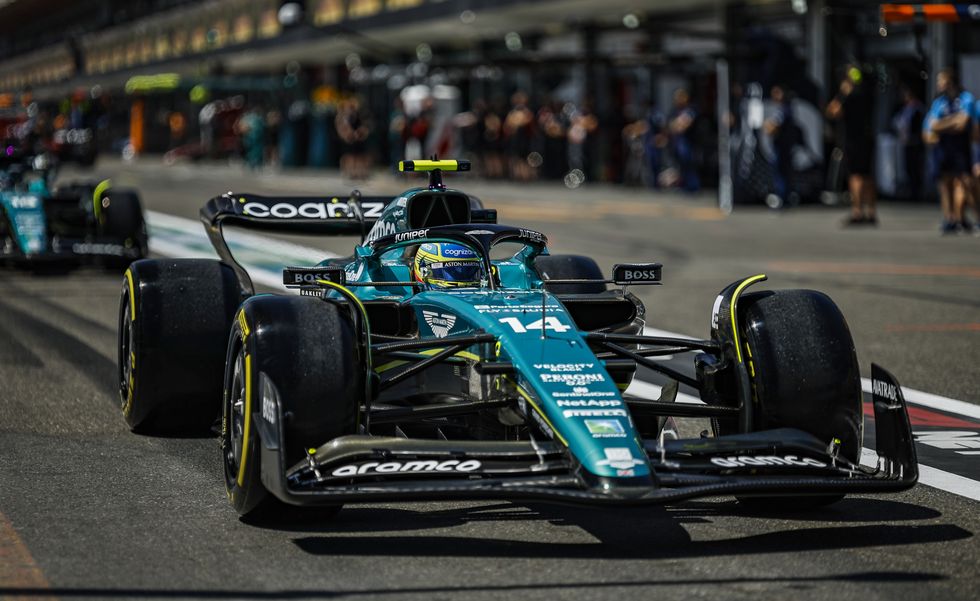- Honda, announcing its partnership with Aston Martin for F1 racing, said it sees the project as a chance to continue its research into carbon neutrality and improve its electric technology.
- 2026 Formula 1 regulations mandate a 50/50 split between engine and electric motor power output and the use of 100 percent sustainable fuel.
- Aston Martin feels that the new regulations will require close relationships between the chassis maker and the power unit supplier.
Way back in 2021, Honda announced it would be stepping away from Formula 1 racing to focus on passenger-car electrification, although it continued to supply power units for the Red Bull and AlphaTauri teams, with excellent results. When Red Bull announced an engine partnership with Ford for 2026, many wondered where that left Honda should it change its corporate mind regarding the value of racing. It appears minds have indeed been changed, but Honda has found a willing chassis partner in Aston Martin.
During a press conference in Tokyo on May 23, Honda announced that it will be part of the F1 Championship for the 2026 season, partnered with the Aston Martin Aramco Cognizant Formula 1 team. Honda will provide power units, encompassing the engine, motors, battery and kinetic energy recovery system (ERS) that make up the complex hybrid F1 drivetrain.
Carbon Neutrality Is Integral
Part of Honda’s revived interest in F1 racing is due to the ambitious goals the series has set for achieving carbon neutrality by 2030, which align with Honda’s own stated goals. New F1 regulations will require that the electric element in the power unit, currently responsible for 20 percent of the power output, will be upped to a 50/50 split, and the combustion engines will need to run on sustainable fuel.
The development of the power units will be under the purview of the Honda Racing Corporation (HRC). “One of our goals in racing is to use it for the development of our young engineers,” said Koji Watanabe, president of Honda Racing Corporation, when asked if the new program would require new hires or adjustment of current staff. “We will of course need to bring in some from the outside, but many of our resources will be from within our internal programs.”
While Honda hopes to develop technologies that might eventually be incorporated into streetgoing machines, Aston Martin is excited to have a partner in development on a works engine rather than simply getting finished power units from a supplier. Martin Whitmarsh, Group CEO of Aston Martin Performance Technologies, says that the new regulations will make integration much more challenging than it is even with the current hybrid units. “A power unit in F1 is not just a combustion engine and a set of turbos. There’s the battery pack, the ERS.” He says that how it is all integrated into the chassis needs to be part of the strategy from day one, and that he believes partnering with Honda will give the two companies the close working relationship needed for success. “We are still young. We need to have the humility to listen to Honda.”
“Honda and our new partner, the Aston Martin F1 Team, share the same sincere attitude and determination to win,” says Toshihiro Mibe, Honda’s Global CEO. “Starting with the 2026 season, we will work together and strive for the Championship title as Aston Martin Aramco Honda.”
This content is imported from poll. You may be able to find the same content in another format, or you may be able to find more information, at their web site.

Senior Editor, Features
Like a sleeper agent activated late in the game, Elana Scherr didn’t know her calling at a young age. Like many girls, she planned to be a vet-astronaut-artist, and came closest to that last one by attending UCLA art school. She painted images of cars, but did not own one. Elana reluctantly got a driver’s license at age 21 and discovered that she not only loved cars and wanted to drive them, but that other people loved cars and wanted to read about them, which meant somebody had to write about them. Since receiving activation codes, Elana has written for numerous car magazines and websites, covering classics, car culture, technology, motorsports, and new-car reviews.
Read the full article here



